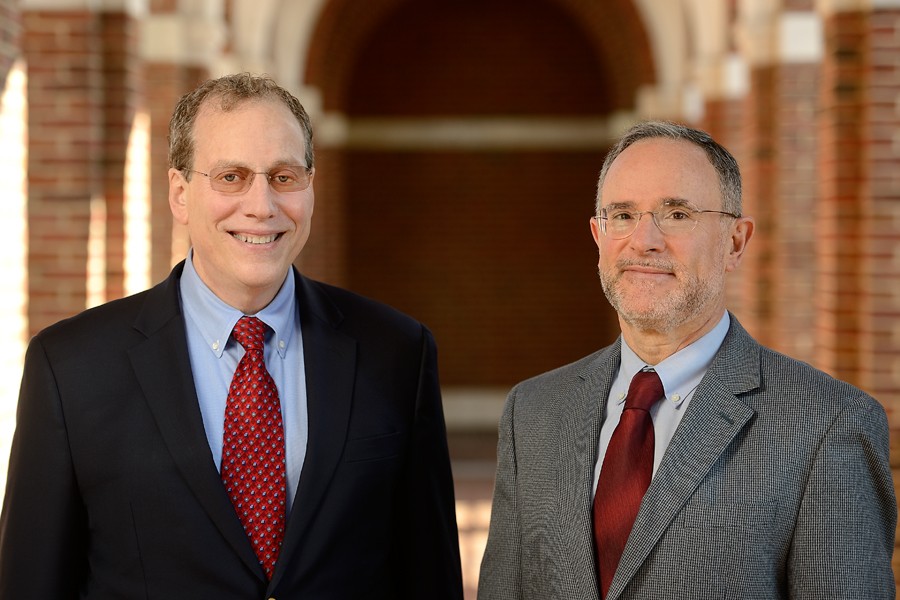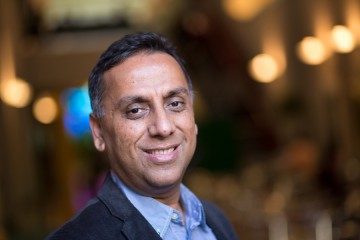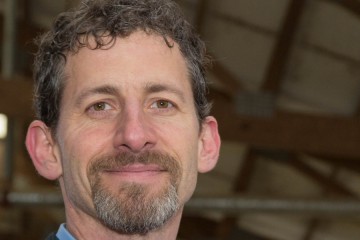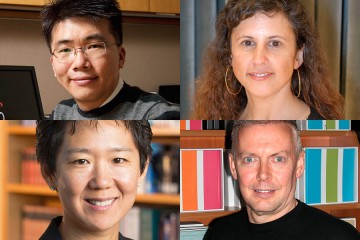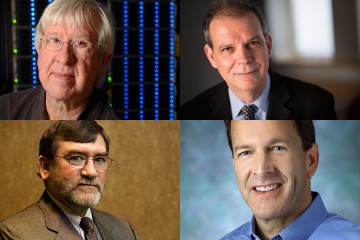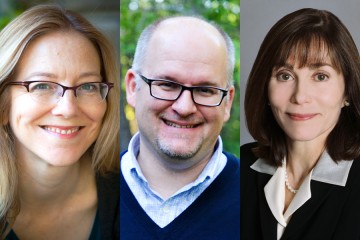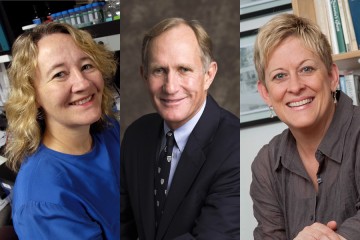One is exploring the origin and evolution of all of space; the other is floating in its simulated conditions to develop pioneering genetic sequencing techniques at zero gravity. Johns Hopkins' two newest Bloomberg Distinguished Professors are definitely out of this world.
Charles "Chuck" Bennett, currently the Alumni Centennial Professor of Physics and Astronomy and Gilman Scholar in the Krieger School of Arts and Sciences, will be the first Bloomberg Distinguished Professor to hold a joint appointment with the Applied Physics Laboratory, as a senior scientist. In step with One University goals to foster interdisciplinary collaboration across divisions, Bennett will direct Space@Hopkins, a new space studies initiative. Space@Hopkins will unify space-related activities across the institution in robotics, astronaut health, planetary sciences, solar physics, Earth science, spacecraft engineering, sensors, and astrophysics.
Andrew "Andy" Feinberg will now be appointed in the Bloomberg School of Public Health's Department of Mental Health and the Whiting School of Engineering's Department of Biomedical Engineering, where he will be mentoring students and teaching an undergraduate course in epigenetics and epigenomics. He currently holds the position of King Fahd Professor and Gilman Scholar in the School of Medicine's departments of Medicine, Oncology, Molecular Biology and Genetics, and Psychiatry and Behavioral Sciences, and the Bloomberg School's Department of Biostatistics. Feinberg directs the Center for Epigenetics, one of the leading research centers in the world focused on the chemical tags of the human genome that tell the cell which genes should be turned on or turned off.
Bennett and Feinberg are the 17th and 18th Bloomberg Distinguished Professors appointed across Johns Hopkins. The professorships are supported by a $350 million gift to the university from Johns Hopkins alumnus, philanthropist, and three-term New York City Mayor Michael R. Bloomberg. The majority of this gift is dedicated to creating 50 new interdisciplinary professorships, galvanizing people, resources, research, and educational opportunities to address major world problems.
"It is with great enthusiasm that we name Andy and Chuck as Bloomberg Distinguished Professors," says Robert Lieberman, provost and senior vice president for academic affairs. "These colleagues have long represented the best of Johns Hopkins—rigorous exploration, dedication to students, a collaborative spirit, and research that not only defies, but truly redefines, traditional disciplines. We look forward to the fruits of increased interdivisional partnership across the university that come with their new appointments."
Charles L. Bennett
Krieger School of Arts and Sciences, Physics and Astronomy
Applied Physics Laboratory
A world‐leading researcher in experimental astrophysics and cosmology, Chuck Bennett focuses on extending our understanding of the universe by observing the cosmic microwave background. He designs and builds novel instruments to study this faint afterglow of energy from the infant universe.
Bennett joined Johns Hopkins in 2005 after 20 years at the NASA Goddard Space Flight Center, where he held the roles of Infrared Astrophysics branch head, senior scientist for experimental cosmology, and Goddard Senior Fellow. While at Goddard, he was the deputy principal investigator for the Differential Microwave Radiometer on the NASA Cosmic Background Explorer, or COBE and principal investigator for the Wilkinson Microwave Anisotropy Probe, or WMAP space missions.
Through his observations of light traveling from the edge of the observable universe, Bennett is able to observe how the universe began. In fact, Bennett's research has already greatly clarified our understanding of the universe. WMAP provided spectacular and unprecedented results, precisely revealing the curvature, age, history, and composition of the universe. The series of papers that present the revolutionary WMAP results have together been cited more than 40,000 times, making them among the most influential series in the history of modern science.
"Chuck's vast experience with new technologies, instrumentation, and scientific space mission design and development uniquely qualifies him to bridge the Applied Physics Laboratory with the Krieger School," says Ralph Semmel, director of APL. "He is exactly the type of scientist who exemplifies the interdisciplinary goals of the Bloomberg Distinguished Professorships, and we look forward to many meaningful collaborations."
Bennett serves as co-director of the undergraduate minor in space science and engineering, which is open to students of both the Krieger and Whiting schools. With his newly expanded role, he will now be able to connect Homewood students to research opportunities at APL. He will continue to teach undergraduate courses and provide substantive undergraduate research experiences while leading the new Space@Hopkins initiative.
"I am truly honored and excited about the opportunity to expand beyond the position I already hold in the Department of Physics and Astronomy. I foresee an ever more promising future of space studies at Johns Hopkins by strengthening the ties between the Krieger School of Arts and Sciences and the Applied Physics Lab," Bennett says. "Together we will strive to answer really big questions from our observations of the sun, Earth, and Pluto, all the way out to the edge of the observable universe."
Bennett is currently the co-principal investigator, with Assistant Professor Tobias Marriage, of the Cosmology Large Angular‐Scale Surveyor, or CLASS, leading an international team in developing and employing an innovative next‐generation facility that will observe the cosmic microwave background from Chile's Atacama Desert. With unparalleled capabilities, CLASS will search for a pattern of cosmic microwave background polarization imprinted by primordial gravitational waves generated at the beginning of the universe. In other words, CLASS will allow us to view what the universe was like 13.8 billion years ago. Detecting this signal has become one of the holy grails of physics: It will not only test the quantum-to-cosmos theory called "inflation" about how the universe began, it also may provide evidence on the connection between the two great pillars of modern physics: Einstein's theory of general relativity and quantum mechanics.
Bennett is also part of the Euclid Consortium and NASA's WFIRST space mission, and is collaborating on the Japanese-led Prime Focus Spectrograph instrument, now under construction in the university's Bloomberg Center for Physics and Astronomy. Each of these initiatives aims to solve the mysteries of dark energy and dark matter in the universe.
Bennett earned his bachelor's degree in physics and astronomy from the University of Maryland and his doctorate in physics from MIT. He also trained in astrophysical instrumentation at the Carnegie Institution of Washington.
Andrew P. Feinberg
School of Medicine, departments of Medicine, Oncology, Molecular Biology and Genetics, and Psychiatry and Behavioral Sciences
Bloomberg School of Public Health, departments of Mental Health and Biostatistics
Whiting School of Engineering, Department of Biomedical Engineering
One of the nation's most influential scientists, Andy Feinberg is considered the founder of the field of cancer epigenetics. During his postdoctoral fellowship at Johns Hopkins, he and Bert Vogelstein, the Clayton Professor of Oncology and Pathology and a Howard Hughes Medical Institution investigator, discovered epigenetic alterations in human cancer. Whereas the gene sequence provides the alphabet of the genetic code, epigenetics provides the grammar that tells genes whether they should be on or off.
Over the decades since, Feinberg and his collaborators have shaped the landscape of our understanding of DNA methylation and other epigenetic changes, and their applications to epidemiology and medicine, and have introduced groundbreaking statistical and laboratory methods to the study of the genome. Regarding the latter, Feinberg is studying the epigenetic effects of spaceflight on the Kelly identical twins as one of 10 principal investigators on NASA's Twins Study.
To explore the possibility of astronauts sequencing their own DNA on future longer flights, Feinberg recently tested laboratory techniques for sequencing at zero gravity in NASA's reduced-gravity aircraft with successful results.
"Andy is a fantastic scholar and is a wonderful addition to the Department of Biomedical Engineering and to the Whiting School," says Ed Schlesinger, the Benjamin T. Rome Dean of the Whiting School of Engineering. "Much of Andy's research brings together experts from disparate fields in order to make major contributions to our understanding of genetics and of epigenetics. Andy is engaged in promising research collaborations with Engineering faculty members and pursuing partnerships that have the potential to make significant advances in medical research."
Together with his insights into loss of imprinting in cancer, Feinberg's work on Beckwith-Wiedemann syndrome established the first causal link between epigenetic changes and cancer risk. Cancer epigenetics has become one of the core areas of cancer research and therapy. Feinberg expanded beyond cancer research to create the first epigenome center in the country to develop tools to understand the role of epigenetics in all aspects of human disease and, in fact, in evolution itself. Discovering most of the previously unknown epigenetic targets that distinguish one person from another, and disease from normal, his center was a major driver of the explosion of epigenetics research worldwide.
"The Bloomberg Professorship is a dream job for me," Feinberg says. "With my colleagues such as John Goutsias in Engineering, we are seeing a deep mathematical structure to epigenetic information, which connects nuclear structure to normal development and disease. With my colleagues in Medicine and Public Health, we can apply these insights to identify risk of disease and even new treatments for cancer that are simply not possible when one studies only the naked DNA sequence," he says. "By working with faculty and students across the university, we finally have the opportunity to understand the relationship between genetics, epigenetics, the environment, and disease—and to use this information to improve human health."
With Daniele Fallin of the Bloomberg School of Public Health, he has pioneered the field of epigenetic epidemiology, demonstrating for the first time how genetics, epigenetics, and the environment interact to cause disease. From the epigenomics of autoimmune disease to rheumatoid arthritis to autism to obesity, Feinberg's leadership has positioned Johns Hopkins at the vanguard of this burgeoning interdisciplinary field.
As a recipient of an NIH Director's Pioneer Award for scientists of exceptional creativity, Feinberg is now pursuing a novel idea that epigenetics might regulate randomness, varying how similar or different one's offspring are, or how different the behaviors of cells might be within a person's tissue. This could provide an advantage in natural selection in a changing external environment, and it also might lead cancer cells to survive internal changes in the body, such as metastasis and chemotherapy.
Feinberg studied mathematics and humanities at Yale University in the directed studies program, received his bachelor's and medical degrees from the accelerated medical program at Johns Hopkins, and completed a master's in public health at the Bloomberg School of Public Health. He held a postdoctoral fellowship in developmental biology at the University of California, San Diego, did clinical training in medicine and medical genetics at the University of Pennsylvania and genetics research at Johns Hopkins, and was an HHMI investigator at the University of Michigan before returning to Hopkins in 1994.




